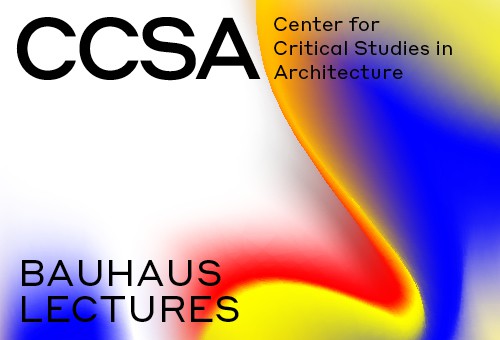Di 28.05.2019
19h00
• Auditorium des DAM
Schaumainkai 43
60596 Frankfurt am Mai
Vortragsreihe BAUHAUS/ARCHITEKTUR
Appropriating Modernism: From the Office to the State
Torsten Lange
&
Michael Osman
Panel discussion moderated by Maxi Schreiber
Torsten Lange
The ghost of design: intellectual labour and building production in 1980s East Germany
My talk focuses on the late socialist re-appropriation of the Bauhaus Dessau, when, following extensive reconstruction in 1976, the modernist icon again became a site for intellectual production. In the hands of the East German state the school was used – first sporadically, and from 1986, officially – as a centre for continuing education for architects, designers and artists, hosting a series of international and interdisciplinary design seminars. If the turn to industrialized construction in the mid-1950s had paved the way for the Bauhaus’s early reassessment, the proliferating scholarship of the 1970s operatively reframed the former as a precursor to the socialist leadership’s housing programme. Now, in the 1980s seminars’ (re)turn to practice, design (rather than technology) became mobilized as the ultimate Bauhaus legacy in an effort to counter the narrow productivist logic of housing construction.
&
Michael Osman
Appropriating Modernism
This talk will consider the writing of two key figures of German architecture culture—Konrad Wachsmann and Sigfried Giedion—and their reflections on the American industrialization of wood construction. It will consider the reasons for their fixation on the balloon frame as a model for modernism’s clarification in Europe and the category error that ensued. From the point of view of mid-19th century American building practices, by contrast, the problem of transmitting design through paperwork serves to recenter modernism’s history around the invention of a difference in the knowledge of art versus craft. It was the specification—a tool for managing the work of various crafts—that helped American architects engage industry, identify their work as “creative,” and therefore also distance it from craft.
Bio
Torsten Lange
Dr. Torsten Lange is Visiting Lecturer for the Theory of Architecture at the Institute gta, ETH Zurich. He studied Architecture at the Bauhaus University Weimar, Germany, and received his Master’s and Ph.D. in Architectural History and Theory from the Bartlett School of Architecture/UCL. His research focuses on twentieth-century architecture and urbanism, especially in socialist Eastern Europe, and examines issues of production, labor and forms of practice, as well as questions of gender and the environment. His work has been published in peer-reviewed journals such as Archimaera, Field, The Journal of Architecture, East Central Europe, and others. He contributed to the edited volumes Industries of Architecture (Routledge, 2016) and Produktionsbedingungen der Architektur (Thelem, 2018). With Ákos Moravánszky, Judith Hopfengärtner, and Karl R. Kegler he co-edited the three-volume publication East West Central: Re-Building Europe, 1950–1990 (Birkhäuser, 2017).
&
Michael Osman
Dr. Michael Osman is Associate Professor of Architecture and Urban Design at UCLA, where he directs the MA and PhD programs in the history and theory of architecture. His book, Modernism’s Visible Hand: Architecture and Regulation in the United States (University of Minnesota, 2018), begins with the question: what is the origin of room temperature? He is a founding member and current chair of Aggregate: The Architectural History Collaborative.
The Bauhaus lecture series is conceived as a commentary to the Bauhaus 100th anniversary. In fourteen lectures and talks, the reception, migration and critique of the Bauhaus and its architecture are presented through a critical perspective.
